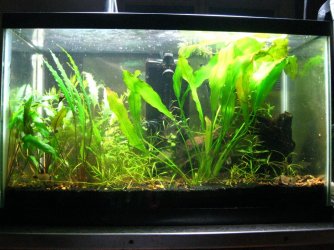I agree with lockman in post #2, but I am going to suggest another option.
The corys (with a couple more) would/should be OK (in terms of bioload) if you like pandas. While this species can attain the more "standard" 2-inch size, they rarely seem to in aquaria. I've had five (the sixth acquired died during quarantine, probably got injured when captured) for five years now and their growth rate compared to the several other species I have in with them and in another tank has been minimal. So I would go with six here, i.e., acquire two more to add in with your four.
This raises other issues though. This species is better with slightly cooler temperatures, say 75F, though my group in my 115g which is 76/77F seem to be doing well. But they also do like water current, more than most corys and many fish, so tankmates have to be carefully chosen in such a small tank where water movement is going to be throughout the tank. In my 5-foot tank I can have a good current at one end that dissipates significantly and this has worked well. The pandas are often seen right up in the filter current, whereas the other corys never do this. I am not suggesting you need a tidal wave current, and I think the Fluval filter would provide all you need here, but place the filter in one of the rear corners with the outflow aimed down the tank along the back wall. This would also increase your circulation generally.
As for tankmates for the corys, if you keep them, the temperature and current issues have to be considered. Also, what are your water parameters? The GH (general hardness) is very important for fish, and some of the species under consideration here would be wild caught and thus more demanding. You can ascertain the GH from your municipal water folks if you don't happen to already know it. And pH is worth knowing too, but a test kit for this is a good investment as regular pH checks can sometimes spot trouble.
I won't suggest other fish uintil I know more of what you intend, in terms of the corys, and also the GH and pH. And get the KH (carbonate hardness or Alkalinity) too, as this impacts the pH and is nice to know.
Byron.


